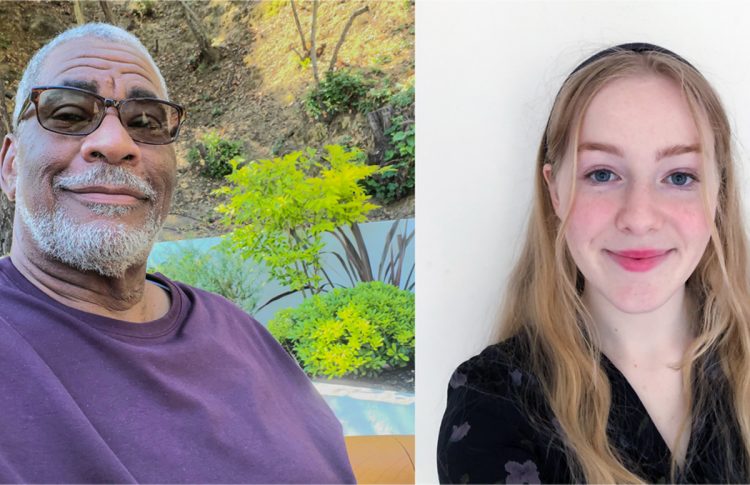The story of one 65-year-old and his new Gen Z friend
By Sarah McKinney Gibson. This article originally appeared on the Next Avenue blog.
While Los Angeles was on lockdown and Black Lives Matter protesters were marching in the streets, Mark Robinson and Ava Brennan were looking forward to their weekly Zoom conversations, discussing everything from sports to LGBT advocacy. When Robinson (63 and Black) brought up the topic of racial justice, Brennan (17 and white) was initially nervous to express her views.
“I didn’t want to come off as a teenager who knows everything and thinks older people are out of touch,” says Brennan. “And I also didn’t want to be lectured about my political beliefs.”
She was pleasantly surprised when neither of those things happened.
“People always want to lump young people together, but Ava breaks the mold.”
“He was so open and just listened,” she says, “and we ended up having a really nice discussion. He shared what he remembers about the civil rights movement, and it was cool to hear his perspective on how younger people like me are fighting for equality right now.”
Sages & Seekers: Combating Age Segregation and Social Isolation
Robinson and Brennan met through Sages & Seekers, a Los Angeles-based nonprofit that combats age segregation and social isolation through meaningful conversation.
Prior to the pandemic, its signature eight-week program took place in-person. In it, older adults packed with wisdom (Sages) are matched with young people looking for mentors (Seekers). Shortly after COVID-19 hit, by necessity, Sages & Seekers introduced the online version Robinson and Brennan are in: “Quarantine Conversations.”
Now, over the course of four weeks, five intergenerational pairs meet together as a group weekly for one hour. They break into pairs for 45 minutes of that time, to allow for more in-depth conversation and relationship building.
So far, there have been 16 of the online programs. There is a long wait list of older adults ready to participate once more students find out about the program and enroll.
Elly Katz, executive director of Sages & Seekers, says the pandemic has made bringing generations together vitally important.
‘The Pandemic Is Increasing Isolation’
“Teens and older adults are the two loneliest age groups in America,” she says. “For the past ten years, we’ve been connecting these marginalized groups, and the pandemic is increasing isolation.”
The benefits of these intergenerational connections go both ways.
Says Katz: “The sharing of life’s successes and failures is incredibly powerful work, as young adults begin to build their own sense of identity and personal independence and older adults reflect on their experiences, accomplishments and contributions.”
Connecting across generations is old hat for Robinson, who spent 40 years working for nonprofits in Cleveland and Washington D.C. “I ran drug programs, youth programs and anything from soup to nuts when it came to working with kids and families,” he says.
But after Robinson’s wife was offered a job at a large health care organization in LA and they relocated there, Robinson struggled to find a satisfying career. Faced with health issues, he made the difficult decision to retire.
Sparking to the Idea of Co-mentorship
The transition wasn’t easy. “I was bored and had to start finding stuff to do,” Robinson says. “I could have gone to the golf course five days a week, but I knew that wouldn’t be enough.”
Robinson spotted Sages & Seekers on AARP’s website and immediately sparked to the idea of co-mentorship.
Meeting Brennan has been a bright spot for him.
“Ava is really a pistol,” Robinson says. “People always want to lump young people together, but Ava breaks the mold. I’ve been working with kids since I was a kid myself, so it’s a joy to meet young people today who have a view of the world that’s different. She’s an inspiration.”
The feeling is mutual.
“Mark’s willingness to self-reflect is something I aspire to,” says Brennan. “We have so much to talk about, and even the stuff we don’t have in common, we can always find common ground on. His passion for sports became a launchpad for conversations about our childhoods.”
Confronting Generational Biases
Brennan discovered Quarantine Conversations through a wellness group she participates in at her high school.
“My family has always been oriented toward social causes,” she says, “and the idea of bridging the gap between generations felt like a nice thing to invest my time in.”
It was also an opportunity to confront some of her own biases, she notes, like believing older people hold more conservative beliefs.
This month, Robinson is co-leading a four-week program for Sages & Seekers focused on racial justice.
“Myself and another African American woman and a young African American kid that’s being raised by a white man, all three of us are the griots,” he says, injecting a West African term to describe the individuals responsible for passing down from one generation to another the history of a village, community and family.
Robinson says Sages & Seekers is giving him something meaningful to focus on during these unsettling times. “It’s making me feel like I’m somebody again. I can’t tell you how important that is,” he notes.
It’s been important to Brennan, too, who now lists intergenerational relationships among the growing number of social causes she is passionate about.
“Just because we grew up in different times,” Brennan says, “doesn’t mean we have to be apart from each other despite all the barriers that exist between us.”
The opinions expressed in this article are those of the author and do not necessarily reflect those of the Diverse Elders Coalition.


